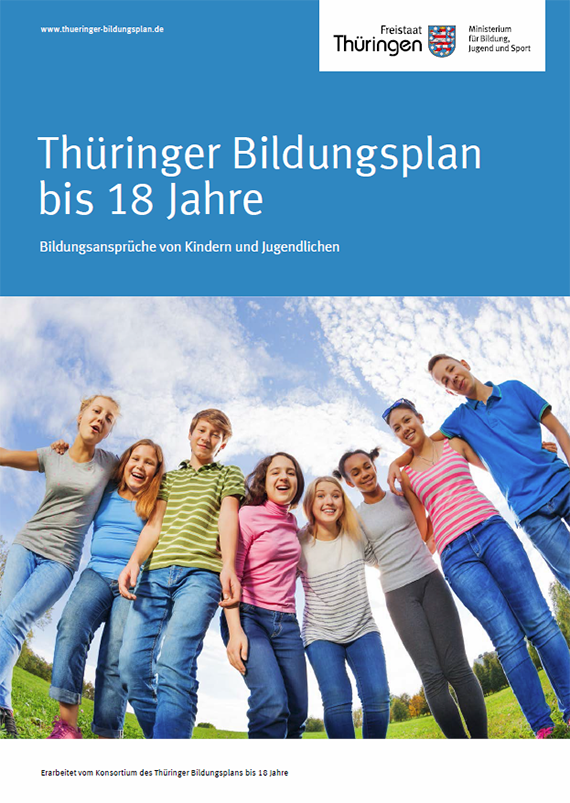Thuringian Education Plan up to 18 years funded by Thuringian Ministry of Education, Science and Culture
Thuringian education plan until 18 years of age
The Thuringian Education Plan for children up to 10 years of age (TBP-10) was expanded to include the youth phase up to 18 years of age in an interactive process between 2011 and 2015, in which science and practice were involved, and published at the end of 2015. In 2016 and 2017, it was presented to the public in a variety of event formats ranging from lectures to intensive workshops. Educators from Thuringian educational institutions from early childhood education to secondary level 2 and vocational schools were informed. It is available as a pdf version to all interested parties via the homepage of the Thuringian Ministry of Education, Youth and Sports.
Philosophy of the educational plan
The Thuringian Education Plan up to the age of 18External link (TBP-18) follows the basic position: The focus of educational work is not on societal demands on children and adolescents, but on educational claims of children and adolescents towards society. Education is to be understood as an active process in which children and adolescents deal with the world against the background of their individual possibilities and to understand and shape their own position in the world.
The education plan describes education independently of institutions or curricula. In ten educational areas, different perspectives on the world are described, which can become effective in any educational situation. School subjects are explicitly not mapped. For example, language education and health education are relevant across subjects. The educational offers described in the educational plan can be realized in various educational situations inside and outside of school lessons. This gives rise to opportunities for cooperation between all actors involved in education.
The educational plan is meant to be a bridge between science and practice as well as between different pedagogical actors. It should function as an instrument of understanding that enables joint work across the boundaries of institutions.
Structure of the educational plan
TBP-18 comprises three main chapters, each of which is divided into several subchapters. In chapter 1, basic positions of educational science, especially the understanding of education, are discussed. The thematic sub-chapters serve to clarify and describe the "overall complex" of education in a structured way. In chapter 2, ten different educational areas are described with basic knowledge and educational content as well as concrete suggestions in the form of tables. In chapter 3, the topics of pedagogical quality and pedagogical quality management are central in order to be able to support the individual educational processes of children and young people as well as possible.
Participating scientists (consortium)
Prof. Dr. Bärbel Kracke (chairwoman)
Friedrich-Schiller-Universität Jena, Institute of Educational Science, Chair of Educational Psychology
Prof. Dr. Michaela Gläser-Zikuda; Friedrich-Alexander-Universität Nürnberg-Erlangen
Prof. Dr. Sandra Fleischer; DPFH Sachsen
Prof. Dr. Ronald Lutz; Fachhochschule Erfurt
Prof. Dr. Ada Sasse; Humboldt-Universität zu Berlin
Prof. Marianne Steffen-Wittek; Hochschule für Musik Franz Liszt Weimar
Prof. Dr. Ulrike Stutz; Universität Erfurt
Prof. Dr. Michael Wermke; Friedrich-Schiller-Universität Jena
Prof. Dr. Volker Woest; Friedrich-Schiller-Universität Jena
Project staff
Michael Wiegleb; Dr. Simone Börner
Bildungsplan Cover
Image: http://www.bildungsplan.uni-jena.de/-
Kracke, Bärbel, Univ.-Prof. Dr Participating scientist (chairwoman) Educational Psychology
Room 119
Am Planetarium 4
07743 JenaImage: Anne Günther (University of Jena)


